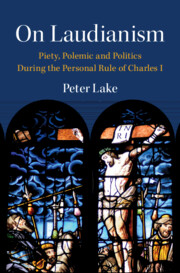Book contents
- On Laudianism
- Cambridge Studies in Early Modern British History
- On Laudianism
- Copyright page
- Contents
- Acknowledgements
- Abbreviations
- Introduction
- Part I Laudianism: Where It Came From
- Part II Laudianism: What It Was
- Part III Laudianism: What It Wasn’t
- Part IV Laudianism and Predestination
- Chapter 26 Laudianism, Puritanism and Arminianism Revisited
- Chapter 27 The Language of Mystery
- Chapter 28 Fatal Necessity
- Chapter 29 Predestination, the Positive Case
- Chapter 30 Faith, Hope and Charity
- Chapter 31 Effort without Merit, Reward without Desert
- Part V Laudianism as Coalition: The Constituent Parts
- Conclusion
- Index
Chapter 28 - Fatal Necessity
from Part IV - Laudianism and Predestination
Published online by Cambridge University Press: 05 October 2023
- On Laudianism
- Cambridge Studies in Early Modern British History
- On Laudianism
- Copyright page
- Contents
- Acknowledgements
- Abbreviations
- Introduction
- Part I Laudianism: Where It Came From
- Part II Laudianism: What It Was
- Part III Laudianism: What It Wasn’t
- Part IV Laudianism and Predestination
- Chapter 26 Laudianism, Puritanism and Arminianism Revisited
- Chapter 27 The Language of Mystery
- Chapter 28 Fatal Necessity
- Chapter 29 Predestination, the Positive Case
- Chapter 30 Faith, Hope and Charity
- Chapter 31 Effort without Merit, Reward without Desert
- Part V Laudianism as Coalition: The Constituent Parts
- Conclusion
- Index
Summary
This chapter explores the Laudian critique of the (allegedly) puritan doctrine of absolute predestination, and particularly absolute reprobation. This critique imputed an absolute, fatal or stoic necessity to questions of salvation and damnation, which, the Laudians claimed, reduced the role of human free will and moral effort to nothing. In so doing it created desperately difficult pastoral dilemmas for ministers trying to rescue members of their flocks from the desperation such doctrines all too often induced. This was particularly the case for absolute reprobation. It was in the course of dealing with puritan error on this subject that the Laudians came to deal with the topic of predestination, and faute de mieux, to adumbrate their own position, asserting that saving grace was offered to all, that Christ died for the sins of the whole world, that God willed the salvation of every sinner, that human effort was required for salvation, that true faith could be totally and finally lost and that no one was simply doomed to damnation; contentions which they defended not as resolutions of the paradoxes at the heart of the debate about predestination, but rather as saving truths central to the nature of Christianity.
Keywords
- Type
- Chapter
- Information
- On LaudianismPiety, Polemic and Politics During the Personal Rule of Charles I, pp. 366 - 375Publisher: Cambridge University PressPrint publication year: 2023

